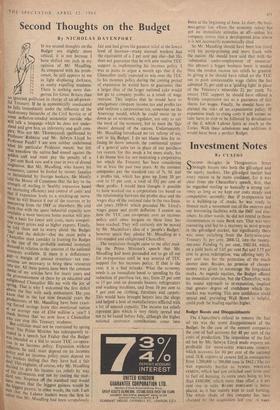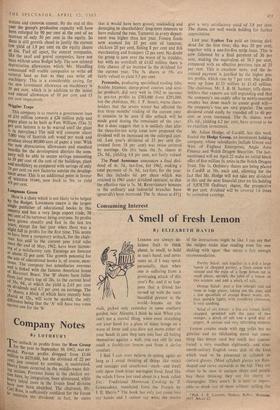Investment Notes
By CUSTOS
SEmma thoughts in Throgmorton Street brought buyers into both the gilt-edged and the equity markets. The gilt-edged market had every reason to be more confident, for it was clear from the Chancellor's speech, first, that he regarded sterling as basically a strong cur- rency as long as we kept our costs steady and competitive: secondly, that if re-expansion led to a building-up of stocks he was ready to finance such a movement out of the reserves and our borrowing facilities with the IMF and else- where. In other words, he did not intend in those circumstances to raise Bank rate. That was very reassuring and led to a recovery in most groups in the gilt-edged market, but significantly there was some switching from the forty-nine-year Treasury 51 per cent, 2008-12, into the twenty- one-year Funding 51 per cent, 19S2-84, which, on a yield basis of 5.65 per cent flat and 5.75 per cent to gross redemption, was offering /only 3s. per cent less for the protection of the much shorter date. Besides, no promise of cheaper money was given to encourage the long-dated stocks. As regards equities, the Budget offered no immediate stimulus, but the Chancellor, with his sound approach to re-expansion, inspired that greater degree of confidence which the market was wanting. This new confidence could spread and, providing Wall Street is helpful, could push the leading equities higher.
Budget Boosts and Disappointments The Chancellor's refusal to remove the fuel oil tax was the worst disappointment of the Budget. In the case of the cement companies the cost of fuel accounts for 48 per cent of the costs of production. The imposition of the fuel oil tax by Mr. Selwyn Lloyd made exports un- profitable for ASSOCIATED PORTLAND CEMENT. which accounts for 80 per cent of the national total. (UK exports of cement fell in consequence from 1,200,000 to 300,000 tons in 1962.) The tax was especially hurtful to TUNNEL PORT-LAND CEMENT, which had just switched over from coal to fuel oil burning, its extra costs being no less than £440.000. which more than offset a 6 per cent rise in sales. RUGBY PORTLAND is better placed. as it has mainly kept to coal burning. The whole shape of this company has been changed by the acquisition last year of EAST- WOODS and CHIN-NOR cement. By the end of this Year the group's productive capacity will have be ea enlarged by 90 per cent at the cost of an increase of only 50 per cent in the equity. So there is still growth ahead to justify the current low yield of 1.9 per cent on the equity shares at 64s. Fuel oil apart, the cement companies, like the sand and gravel companies, have not been without some Budget help. The new mineral depreciation allowances which Mr. Maudling announced will enable companies to write off mineral land as fast as they can write off machinery. This is a considerable saving, for the new investment allowance on machinery is 30 per cent, which is in addition to the initial and annual allowances of 10 per cent and 15 Per cent respectively.
Wiggins Teape
This company is to receive a government loan of £10 million towards a £20 million pulp and Paper plant to be built at Fort William. (The 51 Per cent interest is to be waived until the plant is in operation.) The 'mill will consume about 5,000 tons of Scottish soft wood per week and Produce about 80,000 tons of paper a year. With the new depreciation allowances and standard benefits for the development districts the coin- PanY will be able to secure savings amounting to 59 per cent of the cost of the buildings, plant and machinery as compared with savings of only 24 per cent on new factories outside the develop- ment areas. This is an additional point in favour of WIGGINS TEAM, now back to 56s, to yield 4.9 per cent.
Longinans Green Here is a share which is not likely to be helped by the Budget. LoNcimaNs GREEN is the largest 41ngle publisher of educational books in this Country and has a very large export trade, 70 Per cent of its turnover being overseas. Its profits have grown steadily and fast in the last ten Yeats, except for last year when there was a 8light fall in profits for the first time. This seems to have been a temporary setback, for the chair- man has said in the current year total sales s.ince the end of May, 1962, have been increas- ing at a satisfactory rate. Earnings are forecast at about 72 per cent. The growth potential for the sale of educational books is, of course, enor- mous. The company has subsidiaries overseas and is linked with the famous American house .o_f Harcourt Brace. The 'B' shares have fallen from last year's top of 70s. to the current level of 54s. 6d., at which the yield is 2.65 per cent Fi,n, dividends and 6.7 per cent on earnings. The A. shares, a block of which have recently been 1!aoed at 52s., will soon be quoted, the only difference being that the 'A' will have two votes against one for the 'B.'



































 Previous page
Previous page